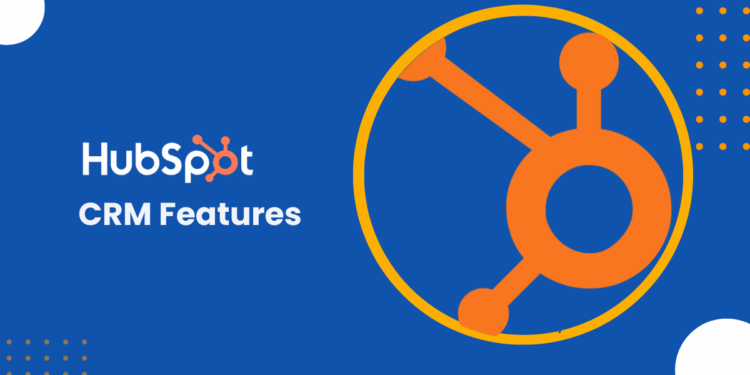Delve into the world of HubSpot CRM, a versatile tool designed to revolutionize how businesses manage their relationships and streamline their processes. Discover how this powerful CRM solution can elevate your business to new heights.
As we dive deeper, uncover the key functionalities and benefits that HubSpot CRM offers, paving the way for enhanced efficiency and growth in your operations.
Introduction to HubSpot CRM
HubSpot CRM is a customer relationship management software that helps businesses manage their interactions and relationships with customers and potential customers. It is designed to streamline processes, improve productivity, and increase sales by providing tools to track leads, automate tasks, and analyze data.
Overview of Features
- Lead Tracking: HubSpot CRM allows businesses to track and manage leads through the sales pipeline, ensuring no opportunity is missed.
- Automated Tasks: The software automates repetitive tasks, saving time and increasing efficiency for sales teams.
- Contact Management: Businesses can organize and manage all customer contacts in one place, making it easy to communicate and follow up.
- Reporting and Analytics: HubSpot CRM provides detailed reports and analytics to help businesses make data-driven decisions and track performance.
- Email Integration: Users can seamlessly integrate their email accounts with the CRM, allowing for easy communication and tracking of interactions.
Benefits for Businesses
- Improved Efficiency: By automating tasks and processes, businesses can save time and focus on more important activities.
- Better Customer Relationships: With centralized contact management and lead tracking, businesses can provide personalized and timely communication to customers.
- Increased Sales: The insights provided by HubSpot CRM help businesses understand customer needs better, leading to more effective sales strategies and increased revenue.
- Scalability: The software can grow with the business, adapting to changing needs and expanding capabilities as the business expands.
Setting up HubSpot CRM
Setting up a HubSpot CRM account is a crucial first step in utilizing this powerful tool for managing customer relationships. Here, we will detail the process of setting up a HubSpot CRM account, identify key steps to configure it for a business, and discuss best practices for customizing settings.
Creating a HubSpot CRM Account
To set up a HubSpot CRM account, visit the HubSpot website and sign up for an account. You will need to provide some basic information about your business and goals to get started.
Configuring HubSpot CRM for a Business
- Define your sales process: Customize the pipeline stages, deal stages, and properties to align with your specific sales process.
- Integrate with other tools: Connect HubSpot CRM with other tools and platforms your business uses, such as email marketing software or e-commerce platforms.
- Set up user permissions: Define roles and permissions for different team members to ensure data security and access control.
- Import existing data: Transfer your existing contacts, deals, and other data into HubSpot CRM for a seamless transition.
Customizing Settings in HubSpot CRM
- Personalize dashboards: Customize your dashboard to display the metrics and data that are most relevant to your business goals.
- Automate workflows: Set up automated workflows to streamline repetitive tasks and save time for your team.
- Create custom properties: Define custom properties to capture unique information about your contacts and deals.
- Utilize reporting tools: Take advantage of HubSpot CRM's reporting tools to track performance and make data-driven decisions.
Using HubSpot CRM for Sales
HubSpot CRM offers a range of features that can significantly streamline the sales process for teams, allowing for more efficient and effective management of leads, deals, and customer interactions.
Tracking Leads and Deals
Sales teams can utilize HubSpot CRM to track leads and deals in a centralized and organized manner, ensuring that no potential opportunity falls through the cracks. Here's how:
- Lead Management:HubSpot CRM helps sales teams capture, store, and manage leads effectively, providing valuable insights into lead behavior and interactions. This allows for personalized and targeted follow-ups to nurture leads towards conversion.
- Deal Tracking:By using HubSpot CRM, sales teams can easily track the progress of deals through the sales pipeline. This includes monitoring deal stages, setting reminders, and assigning tasks to team members, ensuring a smooth and efficient sales process.
Integration of Sales Tools
Integrating sales tools with HubSpot CRM can further enhance efficiency and productivity for sales teams
. Here are some key benefits:
- Email Integration:Seamless integration with email platforms allows sales reps to send personalized emails directly from the CRM, track email opens, and analyze engagement metrics to tailor follow-up communications.
- Automation Tools:Integration with automation tools enables sales teams to automate repetitive tasks, such as lead scoring, follow-up emails, and data entry, saving time and increasing productivity.
- Reporting and Analytics:By integrating reporting and analytics tools, sales teams can gain valuable insights into performance metrics, track key sales KPIs, and make data-driven decisions to optimize sales strategies and processes.
Leveraging HubSpot CRM for Marketing
HubSpot CRM is not just a tool for sales teams, but also a valuable asset for marketers looking to streamline their campaigns, enhance lead nurturing, and improve customer segmentation. By leveraging the features of HubSpot CRM, marketers can create more targeted and personalized marketing strategies.
Campaign Management
- HubSpot CRM allows marketers to track the effectiveness of their campaigns in real-time, providing valuable insights into which strategies are driving the most engagement and conversions.
- Marketers can segment their leads based on various criteria such as behavior, demographics, or engagement level, allowing for more personalized and targeted campaigns.
- Through the integration with HubSpot Marketing Hub, marketers can create automated email workflows, personalized content recommendations, and targeted ad campaigns to nurture leads through the sales funnel.
Lead Nurturing and Customer Segmentation
- HubSpot CRM helps marketers nurture leads by providing a centralized platform to track interactions, schedule follow-ups, and send personalized communications based on lead behavior.
- By segmenting customers based on their preferences, purchase history, or engagement level, marketers can tailor their messages and offers to resonate with specific customer segments, leading to higher conversion rates and customer satisfaction.
- HubSpot CRM's lead scoring feature allows marketers to prioritize leads based on their likelihood to convert, enabling them to focus their efforts on leads that are most likely to result in sales.
Marketing Automation Features
- HubSpot CRM offers robust marketing automation features such as email marketing, social media scheduling, and lead scoring to streamline marketing workflows and improve efficiency.
- With the ability to create automated workflows that trigger based on lead behavior or engagement, marketers can deliver timely and relevant messages to prospects, increasing the chances of conversion.
- Marketers can use HubSpot CRM's reporting and analytics tools to measure the success of their marketing campaigns, identify areas for improvement, and make data-driven decisions to optimize their strategies.
Integrations with HubSpot CRM
Integrating other tools with HubSpot CRM can significantly enhance business operations by streamlining processes, improving data accuracy, and increasing overall efficiency. By connecting HubSpot CRM with popular third-party applications, businesses can create a seamless workflow and maximize the capabilities of the CRM platform.
Popular Integrations Available
HubSpot CRM offers a wide range of integrations with popular tools and software to enhance functionality and meet specific business needs. Some of the most popular integrations include:
- HubSpot Marketing Hub: Integrate CRM with Marketing Hub to align sales and marketing efforts, track leads, and monitor campaign performance.
- Gmail and Outlook: Sync email communication with contacts directly from your CRM for better email tracking and communication management.
- Salesforce: Connect HubSpot CRM with Salesforce for seamless data synchronization, lead management, and sales pipeline visibility.
- Zapier: Automate workflows by connecting HubSpot CRM with thousands of other apps through Zapier, increasing productivity and efficiency.
Benefits of Integrating Third-Party Applications
Integrating third-party applications with HubSpot CRM offers several benefits for businesses looking to optimize their operations:
- Improved Data Accuracy: Integrations ensure that data is consistent across platforms, reducing errors and enabling more informed decision-making.
- Enhanced Efficiency: Streamline processes and eliminate manual tasks by automating workflows through integrations, saving time and resources.
- Better Customer Insights: By integrating CRM with other tools, businesses can gain a holistic view of customer interactions and behavior, enabling personalized and targeted marketing strategies.
- Increased Collaboration: Integrations facilitate seamless communication and data sharing between teams, leading to improved collaboration and alignment across departments.
Closing Notes
In conclusion, HubSpot CRM emerges as a game-changer for businesses looking to optimize their sales and marketing strategies. With its seamless integrations and user-friendly interface, this CRM platform stands as a beacon of innovation in the digital landscape.
FAQ Summary
What makes HubSpot CRM stand out from other CRM solutions?
HubSpot CRM offers a wide range of features, including robust automation capabilities, seamless integrations, and a user-friendly interface that sets it apart from the competition.
Can HubSpot CRM be customized to suit specific business needs?
Yes, HubSpot CRM allows for extensive customization, enabling businesses to tailor the platform to their unique requirements, from custom pipelines to personalized reporting.
How does HubSpot CRM support lead nurturing?
HubSpot CRM provides tools for lead scoring, automated email campaigns, and personalized content creation, facilitating effective lead nurturing strategies for businesses.
Is HubSpot CRM suitable for small businesses?
Absolutely, HubSpot CRM caters to businesses of all sizes, offering scalable solutions that can be tailored to the specific needs and budgets of small businesses.
What kind of reporting and analytics features does HubSpot CRM offer?
HubSpot CRM provides in-depth reporting and analytics tools, allowing businesses to track and analyze key metrics, monitor sales performance, and gain valuable insights for informed decision-making.






